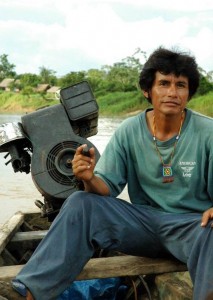Four leaders from Peru’s Ashanika indigenous community, including a prominent opponent of illegal logging, were murdered last week, allegedly by loggers who intruded on their land.

Peru’s largest indigenous organization, Aidesep, said one of the men slain was Edwin Chota, a well-known leader of the Alto Tamaya-Saweto community, located near the border with Brazil in Peru’s Ucayali region.
Aidesep called on the government to arrest and prosecute those responsible for the murders, which media has reported occurred on September 1 but became wider known only this week due to the difficulty in reaching the area.
Aidesep identified the other Ashaninka leaders killed as Leoncio Quincima, Jorge Rios and Francisco Pinedo.
“The four indigenous leaders were murdered for defending their land allegedly from illegal loggers,” Aidesep said in a statement.
Ironically, as the news reached the outside world, Ashaninka leader Ruth Buendia, winner of the prestigious Goldman Prize for work defending the environment, was being honored in Lima by Peru’s Congress, presented with the Congressional Diploma of Honor by the president of Congress, Ana Maria Solorzano.
It was initially unclear how the men were killed, but The Guardian reported on Tuesday that local people had said they were tied up and shot in a soccer field in front of their relatives and other members of the indigenous community. The Intercultural Communication Service, Servindi, said the initial report had been made by an anthropologist and announced in Lima by the deputy minister of Intercultural Affairs.
Threats against Chota were well known. In 2013, National Geographic and the New York Times ran stories about illegal logging in Peru, and the threats that Chota and other indigenous leaders had faced.
“The natives of Saweto have been locked in a struggle to gain titles to their land and expel illegal loggers who have been pillaging their forests in a remote headwaters region along Peru’s border with Brazil,” author Scott Wallace wrote in National Geographic.
Aidesep published on its website an undated interview with Chota, where he says that his community was under threat from illegal loggers, who act with impunity due to the lack of state presence in the border region.
“We don’t have any protection at the moment,” he said. “To defend ourselves, we put our lives at risk.”
Corruption in Peru’s regional governments and slow reaction from the central government has allowed illegal logging to flourish in the Amazon. Environmentalists have documented a system in which permits for logging on formal concessions are sold on the black market to allow loggers to extract mahogany and cedar from indigenous land and other areas. This allows the loggers to pass off the timber as legally extracted wood when they export it to markets in the United States and other countries.
“There’s so much corruption in the regional governments that these logging mafias can kill our brothers with impunity,” Henderson Rengifo, a member of Aidesep, told The Guardian.






ALL Peruanos (AND members of the International Community) should call and write their members of congress and Interior Minister Daniel Urresti to INSIST that this case be given PRIORITY in allocation of Police and Military resources.
It is IMPERATIVE, to maintain this area in a natural state….for the Government of Peru to come down HARD on these ILLEGAL logging operations, (there ARE licensed and LEGAL logging operations) just as Minister Urresti has on ILLEGAL Mining and Coca growing operations in the region.
When living in Pucallpa..years ago…I was able to go upriver and see the depredations of these ILLEGAL Logging, Mining, and “farming” operations….stripping away the thin volcanic topsoil….and rendering the area useless for subsistence growing.
ACTION is required…NOW.
Lima, Peru `10 sept 2014